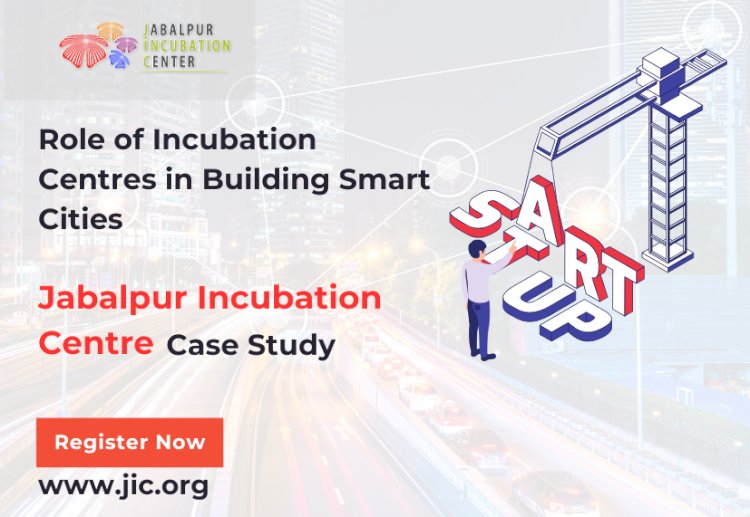The Role of Incubation Centres in Building Smart Cities: A Case Study of Jabalpur
The Jabalpur Incubation Centre is fostering startups in waste management, sustainable infrastructure, and urban mobility, transforming Jabalpur into a model smart city. Collaborations with local government and industry partners ensure these innovations align with the city's goals.

The rapid urbanization in India has led to an increased focus on developing smart cities—urban areas that use technology and innovation to improve the quality of life for their residents. At the forefront of this movement are Incubation centers that play a crucial role in nurturing startups working on smart city solutions. Among these, the Jabalpur Incubation Centre stands out as a key player in driving the growth of smart city initiatives in the region.
How Jabalpur Incubation Centre is Shaping the Future of Smart Cities
The Jabalpur Incubation Centre has emerged as a hub for innovation, particularly in sectors crucial to the development of smart cities, such as waste management, sustainable infrastructure, and urban mobility. Here’s how the center contributes to Jabalpur's transformation into a smart city.
1. Fostering Innovation in Waste Management
Waste management is a significant challenge for cities, especially with growing populations. The Jabalpur Incubation Centre supports startups that are developing innovative solutions to address waste management issues. These startups are leveraging technologies such as IoT (Internet of Things), AI (Artificial Intelligence), and big data analytics to create efficient waste collection, segregation, and recycling systems.
One such startup, incubated at Jabalpur Smart City, has developed a smart waste bin system that not only optimizes waste collection routes but also monitors waste levels in real-time, ensuring timely collection and reducing overflow situations. Such innovations are crucial for maintaining the cleanliness and hygiene of a city, directly impacting the quality of life for its residents.
2. Promoting Sustainable Infrastructure Development
Sustainable infrastructure is the backbone of any smart city. The Jabalpur Incubation Centre is dedicated to supporting startups that are working on eco-friendly construction materials, renewable energy solutions, and green building practices.
For instance, one of the startups at the center has introduced a new type of eco-friendly brick made from recycled materials that significantly reduces the carbon footprint of construction projects. Another startup is focusing on solar energy solutions that can be integrated into existing urban infrastructure, providing clean energy to the city while reducing reliance on fossil fuels.
These innovations are not only contributing to a more sustainable urban environment but are also setting the stage for Jabalpur to become a model smart city in India.
3. Enhancing Urban Mobility
Urban mobility is a critical component of smart cities, ensuring that residents can move efficiently and sustainably within the city. The Jabalpur Incubation Centre is nurturing startups that are creating innovative solutions in this domain, ranging from electric vehicle (EV) infrastructure to smart public transportation systems.
One of the centre’s standout startups has developed a ride-sharing platform that utilizes AI to optimize routes, reducing traffic congestion and lowering emissions. Another startup is working on EV charging stations that are powered by renewable energy sources, making the transition to electric vehicles more accessible and sustainable for the city’s residents.
By addressing the challenges of urban mobility, these startups are helping to create a more connected and efficient urban environment in Jabalpur Smart city.
4. Collaboration with Local Government and Industry
A key factor in the success of the Jabalpur Incubation Centre is its strong collaboration with local government bodies and industry partners. These collaborations ensure that the innovations developed by startups are aligned with the city’s smart city goals and have the necessary implementation support.
The center regularly hosts workshops, hackathons, and networking events that bring together government officials, industry experts, and startup founders. These events foster a collaborative environment where innovative ideas can be transformed into practical solutions that address the specific needs of Jabalpur as it evolves into a smart city.
Conclusion
The Jabalpur Incubation Centre is playing a pivotal role in the development of smart cities by supporting startups that are addressing some of the most pressing challenges in urban living. Through its focus on waste management, sustainable infrastructure, and urban mobility, the center is not only contributing to the growth of Jabalpur but is also setting an example for other cities in India.
As smart cities continue to be a priority for urban development, the role of incubation centers like Jabalpur’s will become increasingly important. By fostering innovation and collaboration, these centers are helping to build the cities of the future—cities that are smart but also sustainable, resilient, and inclusive.
























